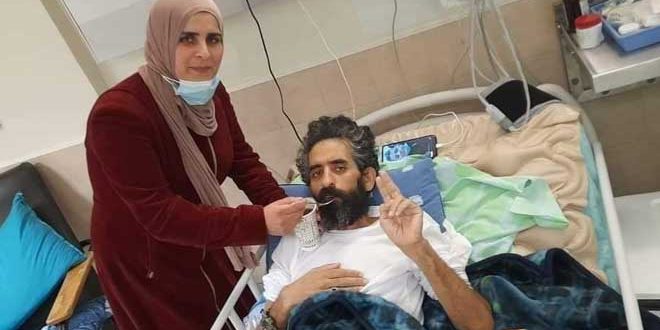With an unrelenting will and firm determination, the Palestinian prisoners in the Israeli occupation prisons continue their steadfastness in the face of their jailers, proving to the whole world that their determination and will is their weapon in order to restore their freedom.
Day after day, the Palestinian captive movement is recording heroic victories achieved by the determination and blood of the prisoners in the occupation prisons. The latest of which was the victory achieved by the 40-year-old prisoner Hisham Abu Hawash who forced the occupation authorities to release him after his 141-day hunger strike in protest against the occupation’s crimes against the prisoners.
“Hunger strikes” which aim to put pressure on the Israeli occupier to recognize the rights of the Palestinian prisoners, began in 1968 in Nablus prison. It is considered the most dangerous and harsh battle that the prisoners resort to in protest against the inhumane practices of the occupation against them, due to the serious risks that it causes, which in many cases lead to their martyrdom.
Abdel Qader Abu Fahm, who was martyred in 1970 during the strike of the Ashkelon prison camp, is considered the first martyr of the captive movement in the battle of the hunger strike. Then Qassem Halawa and Ali Al-Jaafari, were martyred in 1980 during the Nafha prison strike, in addition to Mahmoud Fritikh, who was martyred in the strike of Junaid andHussein Nimr Obeidat, who was martyred in 1990 during the Ashkelon prison strike.
The struggle of the prisoners inside the occupation prisons was accompanied by a state of popular movement and protests in all Palestinian villages and cities in support of their steadfastness and condemnation of the violations and brutal practices they are subjected to by the occupation.
International human rights and humanitarian institutions, led by the Red Cross, are calling for pressure on Israeli occupation to return the bodies of the martyrs it is holding, and the immediate release of the prisoners who are subjected to brutal violations, especially the sick among them.
In the context, the Palestinian Prisoners and Released Affairs Commission warned that the prisoner Nasser Abu Hamid, who suffers from cancer, is encountering death in the occupation’s prisons as a result of his suffering from the consequences of the surgery to remove a cancerous tumor in the lungs. It called on lawful and international establishments to urgently interfere and put pressure on the occupation to release him immediately due to the deterioration of his health.
The Commission confirmed that about 5,000 Palestinian prisoners face harsh detention conditions, including 600 prisoners who need urgent medical intervention as they are suffering from chronic and incurable diseases, noting that 73 out of 227 martyrs had died as a result of medical negligence until the end of last year.
Inas Abdulkareem

